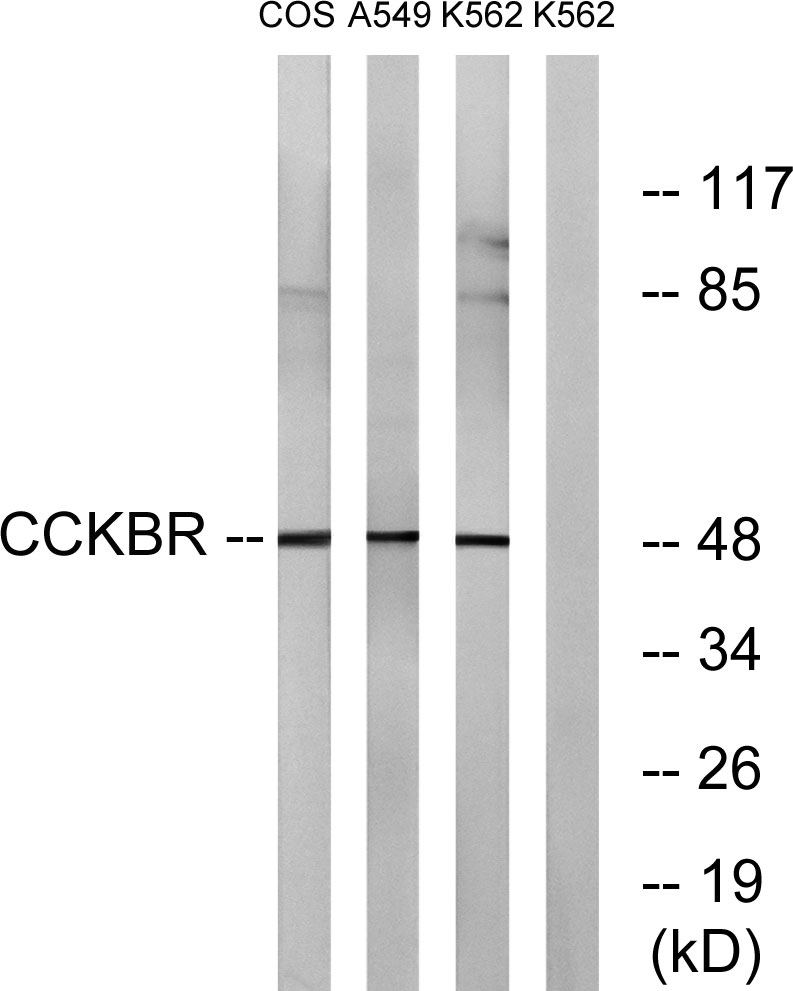CCK-BR Polyclonal Antibody
- Catalog No.:YT0708
- Applications:WB;ELISA
- Reactivity:Human;Mouse;Rat;Monkey
- Target:
- CCKBR
- Fields:
- >>Calcium signaling pathway;>>Neuroactive ligand-receptor interaction;>>Gastric acid secretion
- Gene Name:
- CCKBR
- Protein Name:
- Gastrin/cholecystokinin type B receptor
- Human Gene Id:
- 887
- Human Swiss Prot No:
- P32239
- Mouse Gene Id:
- 12426
- Mouse Swiss Prot No:
- P56481
- Rat Gene Id:
- 25706
- Rat Swiss Prot No:
- P30553
- Immunogen:
- The antiserum was produced against synthesized peptide derived from human CCKBR. AA range:11-60
- Specificity:
- CCK-BR Polyclonal Antibody detects endogenous levels of CCK-BR protein.
- Formulation:
- Liquid in PBS containing 50% glycerol, 0.5% BSA and 0.02% sodium azide.
- Source:
- Polyclonal, Rabbit,IgG
- Dilution:
- WB 1:500 - 1:2000. ELISA: 1:20000. Not yet tested in other applications.
- Purification:
- The antibody was affinity-purified from rabbit antiserum by affinity-chromatography using epitope-specific immunogen.
- Concentration:
- 1 mg/ml
- Storage Stability:
- -15°C to -25°C/1 year(Do not lower than -25°C)
- Other Name:
- CCKBR;CCKRB;Gastrin/cholecystokinin type B receptor;CCK-B receptor;CCK-BR;Cholecystokinin-2 receptor;CCK2-R
- Observed Band(KD):
- 48kD
- Background:
- This gene encodes a G-protein coupled receptor for gastrin and cholecystokinin (CCK), regulatory peptides of the brain and gastrointestinal tract. This protein is a type B gastrin receptor, which has a high affinity for both sulfated and nonsulfated CCK analogs and is found principally in the central nervous system and the gastrointestinal tract. Alternative splicing results in multiple transcript variants. A misspliced transcript variant including an intron has been observed in cells from colorectal and pancreatic tumors. [provided by RefSeq, Dec 2015],
- Function:
- function:Receptor for gastrin and cholecystokinin. The CKK-B receptors occur throughout the central nervous system where they modulate anxiety, analgesia, arousal, and neuroleptic activity. This receptor mediates its action by association with G proteins that activate a phosphatidylinositol-calcium second messenger system. Isoform 2 may regulate cancer cell proliferation via a gastrin-independent mechanism.,online information:Cholecystokinin receptor entry,similarity:Belongs to the G-protein coupled receptor 1 family.,tissue specificity:Isoform 1 is expressed in brain, pancreas, stomach, the colon cancer cell line LoVo and the T-lymphoblastoma Jurkat, but not in heart, placenta, liver, lung, skeletal muscle, kidney or the stomach cancer cell line AGS. Expressed at high levels in the small cell lung cancer cell line H510, at lower levels in H345, H69 and GLC28, not expressed in GLC19. Wit
- Subcellular Location:
- Cell membrane; Multi-pass membrane protein.
- Expression:
- Isoform 1 is expressed in brain, pancreas, stomach, the colon cancer cell line LoVo and the T-lymphoblastoma Jurkat, but not in heart, placenta, liver, lung, skeletal muscle, kidney or the stomach cancer cell line AGS. Expressed at high levels in the small cell lung cancer cell line NCI-H510, at lower levels in NCI-H345, NCI-H69 and GLC-28 cell lines, not expressed in GLC-19 cell line. Within the stomach, expressed at high levels in the mucosa of the gastric fundus and at low levels in the antrum and duodenum. Isoform 2 is present in pancreatic cancer cells and colorectal cancer cells, but not in normal pancreas or colonic mucosa. Isoform 3 is expressed in brain, pancreas, stomach, the stomach cancer cell line AGS and the colon cancer cell line LoVo.
S100A1 is a Potential Biomarker for Papillary Thyroid Carcinoma Diagnosis and Prognosis. Journal of Cancer J Cancer. 2021; 12(19): 5760–5771 WB Human 1:500 Papillary thyroid carcinoma(PTC)tissues,paired normal thyroid tissues
- June 19-2018
- WESTERN IMMUNOBLOTTING PROTOCOL
- June 19-2018
- IMMUNOHISTOCHEMISTRY-PARAFFIN PROTOCOL
- June 19-2018
- IMMUNOFLUORESCENCE PROTOCOL
- September 08-2020
- FLOW-CYTOMEYRT-PROTOCOL
- May 20-2022
- Cell-Based ELISA│解您多样本WB检测之困扰
- July 13-2018
- CELL-BASED-ELISA-PROTOCOL-FOR-ACETYL-PROTEIN
- July 13-2018
- CELL-BASED-ELISA-PROTOCOL-FOR-PHOSPHO-PROTEIN
- July 13-2018
- Antibody-FAQs
- Products Images

- Western Blot analysis of various cells using CCK-BR Polyclonal Antibody

- Western blot analysis of lysates from A549, COS7, and K562 cells, using CCKBR Antibody. The lane on the right is blocked with the synthesized peptide.



